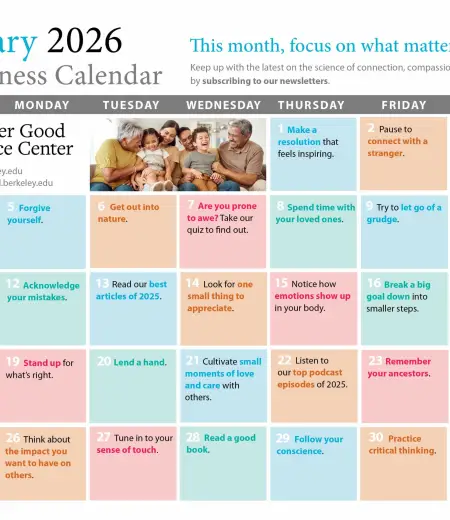Is empathy a limited resource, easily depleted and restricted to those closest to us? That’s the argument psychologist Paul Bloom makes in an essay for this week’s New Yorker, subtitled “The case against empathy.”
He admits that empathy can do a lot of good: Decades of research shows that feeling empathy can lead us to be more caring, forgiving, and altruistic.
But according to Bloom, empathy also can do a lot of bad. It’s an untrustworthy moral compass because it is “parochial, narrow-minded, and innumerate.” Empathy seems tuned to only one frequency, that of a single identifiable victim, with whom we feel some personal connection. According to Bloom, these biases make empathy ill-suited to help us confront crises like natural disasters, genocides, and climate change. Bloom concludes, “Empathy will have to yield to reason if humanity is to have a future.”
According to this argument, empathy is a double-edged sword. It can tug at our heart-strings and move us to help others, but its irrational biases can also be our moral downfall.
Though compelling and provocative, Bloom’s argument rests on empirically questionable assumptions about the limits of empathy—and in some cases, current research outright contradicts his points. In fact, the science says we can expand our empathic bandwidth and sensitize ourselves to situations with large numbers of strangers. The problem isn’t with empathy itself. Instead, it’s how people handle their empathy that matters.
Is empathy like a fossil fuel?
First, consider the claim that empathy is “innumerate”—a word that suggests empathy is a fixed and limited resource, like oil or natural gas.
Many scholars, from Buddhist monks to utilitarian philosophers, have argued that we should expand our moral circles and extend empathy to all beings. Yet Bloom suggests that “our best hope for the future is not to get people to think of all humanity as family—that’s impossible.”
He has an intriguing point: If we are incapable of empathizing with all beings, then empathy may not be the safest basis for universal moral rules. And the research may seem to suggest as much. Many studies show that we empathize more with a single identifiable victim—such as the little girl trapped in the well—than with large groups of suffering victims, like the unidentified masses of starving children overseas. You see this difference if you compare one victim against thousands, against a dozen, or even against two victims. Studies have tried to counteract this identifiable victim effect by encouraging people to think more carefully, but to no avail. It seems like empathy is constrained to the few: When we need to feel the most empathy, we ironically feel the least. As Bloom writes, “It is impossible to empathize with seven billion strangers, or to feel toward someone you’ve never met the degree of concern you feel for a child, a friend, or a lover.”
By this logic, empathy is a limited resource: There’s only so much to go around, so it doesn’t make sense to ask us to extend it to everyone. That would be impossible. But, paraphrasing the cool reason of Star Trek’s Mr. Spock, perhaps the impossible can be more probable than it seems. What if the limits on empathy aren’t so rigid after all?
In my research, I have found that the limits of empathy are actually quite malleable. Mother Teresa once said, “If I look at the mass, I will never act.” If she thought about just how many suffering victims there were in the world, it would have been emotionally paralyzing and prevented her from actually providing help.
When confronted with charity appeals and stories about natural disasters, we may find ourselves in a similar position. We may think that trying to empathize with mass suffering would be emotionally overwhelming or financially unwise, and decide to actively turn off our empathy response. Studies have shown that this process happens when faced with single victims. For instance, college students will avoid situations that trigger empathy for a homeless man if they think they will be asked to donate lots of time or money. Additionally, doctors have been shown to spontaneously suppress empathy for patients’ pain, perhaps as a means to avoid becoming emotionally overwhelmed.
My research builds on these findings and extends them to large-scale crises, such as the unrest in Darfur. As I have described in an earlier piece for Greater Good, “How to Expand Your Compassion Bandwidth,” my work suggests that the identifiable victim effect is due to an active choice to turn off empathy.

But if you get people to think that empathy for others won’t be costly, they don’t show the identifiable victim effect—thus motivation seems to matter. And only people who can skillfully control their emotions show this effect—so emotion regulation seems to matter as well. The identifiable victim is due to strategic empathy avoidance, rather than reflecting a basic limit on how much empathy we can feel.
Therefore empathy doesn’t have to be innumerate: People can feel more empathy for more victims when they want to. Bloom claims that “to the extent that we can recognize the numbers [of victims] as significant, it’s because of reason, not empathy.” My work suggests precisely the opposite—reason often stands in the way, strategically preventing empathy from unfolding when more victims are involved.
Ironically, Bloom foreshadows this point when he notes that “some individuals staunch their empathy through the deliberate endorsement of political or religious ideologies” and that “the empathy gap is situational… they have chosen to shut down their empathetic responses.” But Bloom does not connect the apparent limits of empathy to such empathy avoidance, and thus mistakes a situational empathy gap for a problem inherent to the emotion itself.
The research so far says empathy isn’t a non-renewable resource like oil. Empathy is more like wind or solar power, renewable and sustainable.
Is all empathy local?
This confusion also applies to Bloom’s second claim, that empathy is “parochial”—that we can apply it only to those who are like us or physically close to us. By focusing us on salient victims close to home—as Americans did when violence struck Newtown and Boston—empathy may seem to blind us to victims that are physically far away or socially distant. Or even to our future selves, as in the case of global warming and its long-term effects. We feel more empathy for those that are near and dear.
But again, this may not be a limit inherent to empathy itself but have more to do with how we handle our empathy. Empathy for the in-group over the out-group may reflect a strategic decision to erase empathy for people who are different. My lab is currently exploring how these parochial biases in empathy may be due to strategic decisions to regulate empathy to avoid perceived costs.
Empathy may not be limited by scope or similarity. What may matter more is whether you think that empathy is limited in these ways. Some situations and traits make people afraid that empathy will be overwhelming or threatening, and so they make themselves callous. A comparable debate exists over ego depletion—that self-control is a limited resource that gets tired, like a muscle. Some studies have found that self-control is a limited resource only for the people who believe that it’s a limited resource. In a similar vein, the people who believe that compassion is a limited resource may avoid feeling empathy altogether, creating the very deficit they were worried about.
These considerations imply that people’s expectations about empathy can have powerful effects on how much empathy they feel, and for whom. Identification with all humanity is an empirically documented individual difference that predicts more empathic emotion and behavior. And research with mindfulness interventions suggests that training people to approach, rather than avoid, their emotional experiences can decrease fear of empathy and increase pro-social behavior.
Is empathy amoral?
Even were Bloom to concede the previous points, there is a deeper concern that his essay raises: that “empathy leads us astray only when we take it as a moral guide.”
 The Roots of Empathy program (above) brings babies into classrooms to foster empathic skills. Evaluations have found that it reduces aggression, boosts emotional literacy, and creates more caring children.
The Roots of Empathy program (above) brings babies into classrooms to foster empathic skills. Evaluations have found that it reduces aggression, boosts emotional literacy, and creates more caring children.
Bloom acknowledges that clinical psychopaths show no empathy and commit morally atrocious behaviors. But he claims that empathy may not be necessary for morality, as autistic individuals who lack empathy can still act morally because of their strict adherence to moral rules.
What he fails to note is that for many people, empathy and moral rules are tightly bound to one another. Research finds that people who value being moral also tend to feel more empathy.
Indeed, empathy may be the motivating “spark of fellow-feeling” that connects a cognitive appreciation of moral rules to actual moral behavior. One of the messages from Simon Baron-Cohen’s book The Science of Evil (cited by Bloom) is that empathy suppression in everyday contexts can create a moral landscape not unlike that of the psychopath. For those of us who create situational empathy gaps by actively pushing empathy to the side, we may erode the bedrock of our own morality.
Bloom claims that “there is no evidence to suggest that the less empathetic are morally worse than the rest of us.” In fact, the research says otherwise. In my work, I have found that people who regulate empathy—by comparison to those who regulate distress or who do not regulate any emotion—erode their moral principles and values. As Greater Good has pointed out, callousness has a cost: suppressing empathy forces people into a state of cognitive dissonance in which they begin to either value morality less or relax their standards for moral behavior. Importantly, these facets of the moral self-concept each predict real-world moral behavior.
As Bloom rightly notes, some situations really seem to require us to override empathy. Think about the surgeon in the operating room, the judge who has to make a fair ruling, or the public health official who has decided to sacrifice some lives to save many more. Pushing empathy aside might seem like the right course of action in these cases because it clarifies the moral principles in play. But research suggests that doing so might actually undermine these principles and have worse consequences down the road.
Empathy doesn’t erode on its own. We make active choices to push empathy to the side, and that is what seems to account for the supposed limits and biases of empathy. If we understand that, then we can understand how to keep renewing and expanding our feeling for others.







Comments